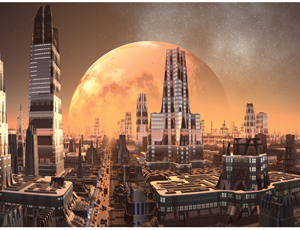
Nothing original was ever built or invented unless someone imagined it first. But in the extremely practical world of construction, almost everything we set out to imagine and build is based on what is currently doable. Almost all cutting-edge industry innovations are built on the last string of innovations that proved out and paid off.
Science fiction, however, earns its special place by opening a gap between what we can do today and what we might do tomorrow. It bridges that gap with a magical span that requires no buttressing and no load calculations, only conceivability.
ENR left the style of presentation wide open, although nearly all the submissions fell into two categories: those that developed story lines, characters and plots and those that took the form of futuristic proposals, essays or presentations delivered at future dates. Those in the latter category are not competitive as stories, but are still rich with ideas. We plan to post many in coming months. Judges acknowledged stories for their construction vision but also for capturing the reader with entertainment and good storytelling.
Judging was blind. Aside from the contest manager, no one on ENR's staff or the judges' panel knew who the authors were until the decisions were made final.
Email comments from authors suggest many found the project liberating and fun. "Thank you for conducting this contest. Preparing the entry was not only thoroughly enjoyable, it was also a great learning experience," commented Walker Lee Evey, who wrote "Of Man and Mouse."
Several mentioned the pleasure of brainstorming with colleagues, although some also shared a hope expressed by Sam Florman—author of the entry "In the Face of Disaster,"—that some stories deal with moral questions as well as technical wonders. "So much for you judges to consider. I'm not really competing for an award, just want to be part of the fun. And it's more than fun: Inspiring young and enthusiastic writers about engineering's future—that's a worthy cause," Florman wrote.
Join the conversation at #ENRCSF



Post a comment to this article
Report Abusive Comment